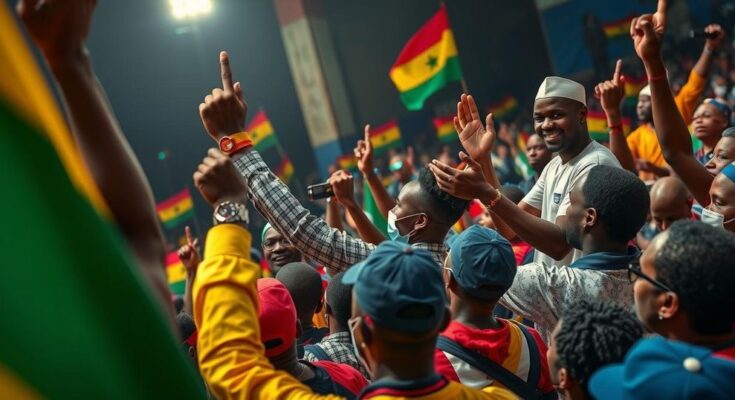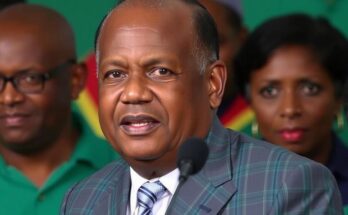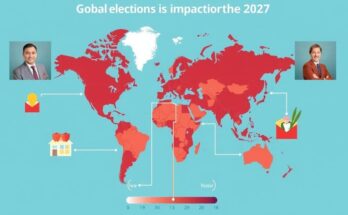In Ghana, the leading presidential candidates ahead of the December elections are uniting around a common theme of a crackdown on LGBTQ+ rights, exacerbating an already hostile climate for the LGBTQ+ community. The Supreme Court’s ruling on the legality of a proposed bill imposing severe penalties on LGBTQ+ individuals is expected shortly after the elections, further complicating the electoral choices of these communities amidst rising fears of persecution and discrimination.
In Ghana, the upcoming general elections present a daunting scenario for the LGBTQ+ community, as all leading presidential candidates have vowed to enforce stringent measures against LGBTQ+ rights. The electoral victor will likely have the task of either signing or vetoing a controversial bill that imposes harsher penalties for LGBTQ+ individuals, including imprisonment for same-sex activity and identifying as non-binary. Concerns regarding the implications of this proposed legislation are heightened by the impending decision of the Supreme Court, which will rule on the bill’s constitutionality shortly after the election, further complicating the choices facing voters from the LGBTQ+ community.
The ruling party’s candidate, Mahamudu Bawumia, has openly expressed a commitment to signing the bill into law should he be elected. His main opponent, former president John Dramani Mahama, has similarly emphasized the need for stricter legislation against homosexuality, aligning with the growing anti-LGBTQ+ sentiment among the electorate. Public opinion reflects a significant resistance to LGBTQ+ rights, with a mere 7% of Scots previously indicating tolerances, as articulated by an Afrobarometer survey from 2021. This prevailing sentiment has fostered a climate of fear among LGBTQ+ individuals, as potential legal repercussions loom overhead.
Legal experts and human rights activists have voiced serious concerns about the broad scope of the proposed legislation, which seeks not only to criminalize same-sex activities but also to penalize individuals for failing to report known LGBTQ+ persons. Such measures would deepen the existing social stigma and likely lead to increased violence and discrimination against LGBTQ+ individuals, as has been observed in response to similar proposals in the past. Activists argue that this legislative climate has compelled many within the LGBTQ+ community to conceal their identities, resulting in lost opportunities across various facets of life including employment and education.
Internationally, the bill has drawn criticism for potentially violating both Ghana’s constitutional rights and its commitments to human rights. The European Union characterized the bill’s progression as “profoundly disturbing,” signaling potential economic repercussions for the nation if such legislation is enacted. The Supreme Court’s decision regarding the legality of the bill is anticipated to arrive after the election, leaving many voters, such as Abena, feeling uncertain and unsafe in making electoral choices that affect their futures.
In summary, the interplay between Ghana’s political landscape and the societal views on LGBTQ+ rights exemplifies a significant challenge ahead of the elections. With candidates leveraging anti-LGBTQ+ sentiments to rally support, the community faces an increasingly perilous environment characterized by fear and potential legal repercussions. As the world watches, the outcome may serve as a pivotal moment for human rights in Ghana, particularly for the LGBTQ+ population.
The context surrounding the upcoming general elections in Ghana unfolds against a backdrop of intense anti-LGBTQ+ sentiment rooted in the nation’s conservatism and religious beliefs. The proposed legislation, which has emerged from this climate, seeks to tighten restrictions on LGBTQ+ individuals and is reflective of longstanding societal biases against sexual and gender minorities. Political parties are keenly aware of the public’s stance, as evidenced by drastically low tolerance for LGBTQ+ relationships, compelling candidates to position themselves favorably within that framework as they vie for electoral support. Concurrently, human rights advocates are raising alarms about the implications such legislation would have on both the safety and the rights of LGBTQ+ communities.
The forthcoming elections in Ghana represent a critical juncture for the LGBTQ+ community amidst a troubling political and societal backdrop. With all leading candidates pledging to enhance legal penalties against LGBTQ+ individuals, and the impending judgement concerning the constitutionality of the proposed bill, the stakes remain high. The path forward remains fraught with challenges for LGBTQ+ individuals, who may find their rights severely curtailed and safety compromised, highlighting the broader implications for human rights in Ghana.
Original Source: www.voanews.com



